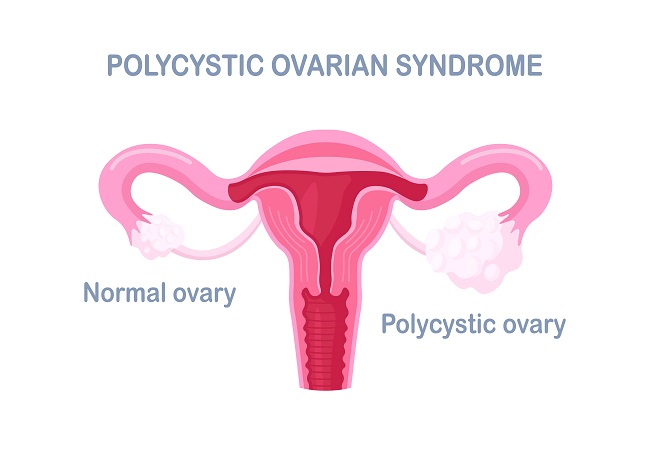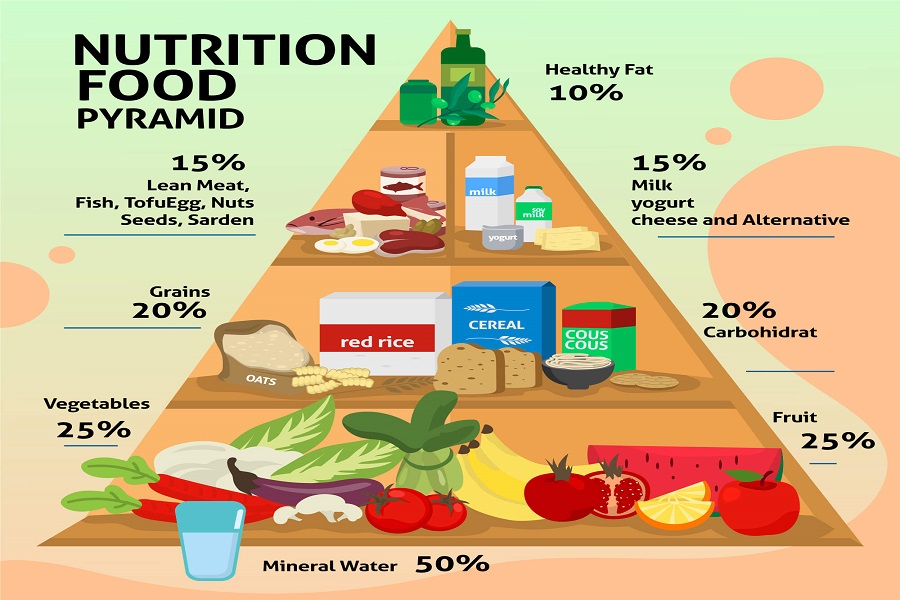What is PCOS?

Polycystic Ovary Syndrome (PCOS)
Polycystic Ovary Syndrome (PCOS), is a hormonal disorder which is known to affect women’s reproductive system. It is characterized by an imbalance in the levels of reproductive hormones, leading to the development of small cysts on the ovaries. These cysts, which are actually immature follicles containing eggs, can cause irregular menstrual cycles and difficulty getting pregnant.
Symptoms of PCOS:
PCOS manifests differently in each individual. Some of the very common PCOS symptoms include:
- Irregular periods: Women with PCOS often experience irregular menstrual cycles, ranging from infrequent to prolonged periods or even the absence of menstruation.
- Excess androgen: High levels of male hormones, such as testosterone, can lead to physical signs like excess facial and body hair, acne, and male-pattern baldness.
- Polycystic ovaries: The ovaries may become enlarged and develop multiple small cysts, causing a characteristic “string of pearls” appearance on ultrasound.
- Weight gain: Many women with PCOS struggle with weight gain and have a higher risk of obesity.
- Insulin resistance: Women with PCOS often have insulin resistance, which can contribute to the development of type 2 diabetes.
- Infertility: Difficulty getting pregnant is a common concern for women with PCOS due to irregular ovulation or anovulation (lack of ovulation).
- Mood disorders: Anxiety and depression are more common in women with PCOS.
It’s essential to consult a healthcare professional if you suspect you may have PCOS. Early diagnosis and treatment can help manage symptoms and reduce the risk of long-term health complications.
Causes of PCOS:
The exact cause of PCOS remains unclear, but several factors have been identified that may contribute to the development of the condition:
- Genetics: PCOS appears to have a hereditary component. Women with a family history of PCOS are known to be more likely to develop the condition.
- Insulin resistance: High insulin levels can stimulate the ovaries to produce more androgens, leading to PCOS symptoms.
- Inflammation: Low-grade inflammation has been linked to the development of PCOS. Inflammation can trigger the ovaries to produce androgens, causing symptoms.
- Environmental factors: Exposure to certain environmental factors, such as endocrine-disrupting chemicals, can potentially increase the risk of developing PCOS.
Also Read: PCOS Treatment in India
Engaging with PCOS:
Understanding PCOS is the first step towards managing the condition. The following tips can help women with PCOS improve their quality of life:
- Seek professional help: Consult a healthcare provider for a proper diagnosis and tailored treatment plan.
- Follow PCOS Diet: Adopting a balanced PCOS diet plan to lose weight and engage in regular exercise can help manage weight and improve insulin resistance.
- Manage stress: Mindfulness techniques, such as meditation and yoga, can help reduce stress and improve mental well-being.
- Join a support group: Connecting with others who share similar experiences can provide emotional support and practical advice.
Remember, PCOS is a manageable condition. By understanding its symptoms, causes, and potential treatments, women with PCOS can take control of their health and lead fulfilling lives.
Conquering PCOS with Diet: Your 7 day PCOS Diet Plan to Lose Weight
A well-balanced diet plays a crucial role in managing Polycystic Ovary Syndrome (PCOS). By making informed choices about what to eat and what to avoid, you can control your weight, insulin resistance, and hormone levels. Let’s explore the essentials of a PCOS-friendly diet and dive into a 7-day meal plan to help you on your journey.
What is a PCOS Diet?

PCOS Diet
A PCOS diet is a nutritional plan specifically designed for women with Polycystic Ovary Syndrome. It focuses on consuming whole, nutrient-dense foods that help manage insulin resistance, inflammation, and hormone levels. The primary goal is to maintain a healthy weight and support overall well-being.
PCOS Diet Chart :
Polycystic Ovary Syndrome (PCOS) is a hormonal disorder in women that affects women’s fertility. A healthy diet and lifestyle can help manage the symptoms and promote weight loss. This PCOS diet chart focuses on consuming foods that help regulate hormones, improve insulin sensitivity, and support weight loss.
7 day PCOS Diet Plan to Lose Weight:
Below is a 7-day PCOS diet plan to lose weight for women with PCOS. This plan is designed to incorporate balanced meals with an emphasis on a low-glycemic index (GI) carbohydrates, lean protein, and healthy fats.
| Days | Breakfast | Lunch | Dinner |
|---|---|---|---|
| Day 1 | Spinach and Feta Omelette | Quinoa Salad with Grilled Chicken | Baked Lemon Herb Salmon with Steamed Broccoli |
| Day 2 | Greek Yogurt with Berries and Chia Seeds | Lentil Soup with Whole-Grain Bread | Stuffed Bell Peppers with Brown Rice |
| Day 3 | Overnight Oats with Almond Milk and Mixed Nuts | Turkey Wrap with Hummus and Mixed Greens | Zucchini Noodles with Pesto and Cherry Tomatoes |
| Day 4 | Green Smoothie (Spinach, Avocado, Banana, Almond Milk) | Chickpea Salad with Lemon-Tahini Dressing | Cauliflower Fried Rice with Grilled Tofu |
| Day 5 | Vegetable Frittata | Grilled Vegetable Panini with Mozzarella | Garlic Shrimp with Quinoa and Asparagus |
| Day 6 | Chia Seed Pudding with Fruit and Almond Butter | Roasted Beet Salad with Goat Cheese | Turkey Chili with Avocado and Greek Yogurt |
| Day 7 | Whole-Grain Waffles with Fresh Berries | Caprese Salad with Whole-Grain Crackers | Eggplant Parmesan with a Side Salad |
7-Day PCOS Diet Plan Indian:
| Day | Breakfast | Lunch | Dinner |
|---|---|---|---|
| Day 1 | Oats Poha | Grilled Chicken Salad | Quinoa Pulao |
| Day 2 | Ragi Dosa | Brown Rice and Lentil Khichdi | Grilled Fish and Steamed Vegetables |
| Day 3 | Greek Yogurt Parfait | Chickpea Salad | Baked Tofu with Stir-Fried Vegetables |
| Day 4 | Veggie Omelette | Spinach and Paneer Curry | Mushroom and Bell Pepper Stir Fry |
| Day 5 | Smoothie Bowl | Mixed Vegetable Curry | Eggplant and Chickpea Curry |
| Day 6 | Millet Upma | Sprouted Beans Salad | Chicken and Vegetable Soup |
| Day 7 | Whole Wheat Pancakes with Fruits | Cauliflower and Green Peas Curry | Lentil Soup and Brown Rice |
Benefits of the PCOS Diet Chart :
Below are the benefits of following the 7-day PCOS Diet Plan:
- Hormone Regulation: This diet plan includes foods that are rich in omega-3 fatty acids, fiber, and antioxidants, which help regulate hormones and reduce inflammation associated with PCOS.
- Insulin Sensitivity: Consuming whole grains, lean proteins, and healthy fats can improve insulin sensitivity and help manage blood sugar levels, reducing the risk of insulin resistance and type 2 diabetes.
- Weight Loss: By focusing on nutrient-dense foods and portion control, this diet plan can help promote weight loss. Losing weight can alleviate some symptoms of PCOS, such as menstrual irregularities and infertility.
- Improved Gut Health: A diet high in fiber, lean proteins, and healthy fats can support gut health, which plays a crucial role in hormone regulation and overall health.
- Sustainability: This 7-day meal plan offers a variety of delicious and nutritious meals, making it easier to stick to the diet and maintain a healthy lifestyle.
Remember to drink enough water and do exercise regularly along with following the PCOS diet chart also consult with a healthcare professional before making any significant changes to your diet, especially if you have PCOS or any other medical conditions.
Also Read: What Does a PCOS Belly Shape Look Like?
Foods to Consume in PCOS:
A PCOS-friendly diet should include the following food groups:
- Low-GI carbohydrates: Choose whole grains, legumes, and non-starchy vegetables to help manage blood sugar and insulin levels.
- Lean protein: Opt for lean sources of protein like chicken, turkey, fish, tofu, and legumes to support muscle growth and hormone balance.
- Healthy fats: Incorporate sources of healthy fats like avocados, olive oil, nuts, and seeds to support hormone production and reduce inflammation.
- Fiber: Eating high-fiber foods like fruits, vegetables, and whole grains can help regulate digestion and support weight management.
- Antioxidant-rich foods: Consume colourful fruits and vegetables, such as berries, leafy greens, and bell peppers, to combat inflammation and oxidative stress.
- Dairy alternatives: Choose plant-based alternatives like almond milk, coconut milk, or soy milk to avoid potential hormonal imbalances associated with dairy products.
- Spices and herbs: Incorporate anti-inflammatory spices and herbs like turmeric, cinnamon, and ginger to enhance flavour and support overall health.
Foods to Avoid in PCOS:
To better manage PCOS symptoms, it’s essential to limit or avoid certain foods:
- Refined carbohydrates: Minimize consumption of white bread, white rice, and sugary snacks, which can cause blood sugar spikes and worsen insulin resistance.
- Saturated and trans fats: Avoid unhealthy fats found in fried foods, processed snacks, and baked goods, which can contribute to inflammation and weight gain.
- High-GI fruits: Limit high-GI fruits, such as ripe bananas and pineapples, to prevent blood sugar fluctuations.
- Processed meats: Steer clear of processed meats like hot dogs, sausages, and deli meats, which can be high in sodium and saturated fats.
- Sugary beverages: Avoid sodas, fruit juices, and energy drinks, as they can lead to blood sugar spikes and weight gain.
- Alcohol: Limit alcohol consumption, as it can contribute to inflammation and negatively impact blood sugar levels.
- Caffeine: Some women with PCOS may be sensitive to caffeine, so consider reducing or avoiding caffeine to see if symptoms improve.
Remember, a healthy, balanced diet is essential for managing PCOS symptoms and improving overall well-being. By following the 7-day meal plan and incorporating the suggested food choices, you can take a proactive approach to managing PCOS and enhancing your quality of life. Always consult with a healthcare professional or a registered dietitian before making significant changes to your diet.
Also Read: PCOD Problem Symptoms
Do’s and Don’ts for Managing PCOS: Quick Tips for a Healthier Lifestyle
Living with Polycystic Ovary Syndrome (PCOS) can be challenging, but adopting healthy habits can help you manage symptoms. Here’s a list of do’s and don’ts to keep in mind.
Do’s
- Stay active: Engage in regular exercise to maintain a healthy weight, improve insulin sensitivity, and boost mood.
- Eat mindfully: Focus on a well-balanced diet that includes low-GI carbs, lean protein, healthy fats, fiber, and antioxidant-rich foods.
- Manage stress: Incorporate relaxation techniques like meditation, yoga, or deep breathing exercises to reduce stress and promote overall well-being.
- Seek support: Connect with others who understand your journey, whether through support groups, online forums, or friends and family.
- Consult healthcare professionals: Work closely with your healthcare team to create a tailored treatment plan and monitor your progress.
Don’ts
- Skip meals: Avoid skipping meals, as this can lead to overeating and blood sugar fluctuations.
- Rely on fad diets: Steer clear of unsustainable diets that may not provide the necessary nutrients for long-term health.
- Overlook mental health: Be aware of your emotional well-being, and seek professional help if needed.
- Ignore symptoms: Pay attention to your body and consult your healthcare provider if you notice any changes or concerns.
- Give up: Remember, managing PCOS is a lifelong commitment. Stay positive and proactive to lead a healthy, fulfilling life.
Conclusion:
Polycystic Ovary Syndrome (PCOS) is a common hormonal disorder that affects women of reproductive age, presenting a wide range of symptoms such as irregular periods, excess androgen, polycystic ovaries, weight gain, insulin resistance, infertility, and mood disorders. While the exact cause remains unclear, factors like genetics, insulin resistance, inflammation, and environmental influences play a role in its development.
Managing PCOS involves understanding the condition and adopting a healthy lifestyle. A PCOS-friendly diet, including low-GI carbohydrates, lean protein, healthy fats, fiber, and antioxidant-rich foods, is crucial for controlling symptoms. The 7-day meal plan provided serves as a starting point for making informed dietary choices, while the do’s and don’ts offer guidance for maintaining a healthier lifestyle.
Remember to consult healthcare professionals for a proper diagnosis and tailored treatment plan. By staying proactive and informed, women with PCOS can effectively manage their symptoms and improve their overall well-being.
Also Read: PCOS Diagnosis & Treatment
F.A.Q:
Q: Which diet is best for PCOS?
A: There is no one-size-fits-all answer to this question, as the best diet for PCOS may vary from person to person depending on individual needs and health goals. However, some common dietary recommendations for managing PCOS include a balanced and nutrient-dense diet that includes plenty of whole grains, fruits, vegetables, lean protein, and healthy fats.
Q: What not to eat if you have PCOS?
A: Some foods that may exacerbate PCOS symptoms include processed and sugary foods, refined carbohydrates, red meat, and dairy products. It is also important to limit caffeine and alcohol consumption and to avoid or minimize the intake of foods with high levels of saturated and trans fats.
Q: Which fruit is best for PCOS?
A: Fruits that are low in sugar and high in fiber are generally good choices for people with PCOS. Some good options include berries (such as strawberries, raspberries, and blueberries), apples, oranges, and grapefruit.
Q: Is milk good for PCOS?
A: The impact of milk on PCOS is still a topic of debate. Some studies suggest that dairy products, including milk, may increase insulin levels and worsen PCOS symptoms in some people. However, more research is needed to better understand the relationship between dairy intake and PCOS.
Q: Is Egg good for PCOS?
A: Eggs are a good source of protein and other nutrients, and they can be part of a healthy diet for people with PCOS. However, it is important to limit egg intake and choose low-fat cooking methods, as excessive consumption of saturated fats and cholesterol may exacerbate PCOS symptoms.
Q: Can I eat rice in PCOS?
A: Yes, people with PCOS can eat rice as part of a balanced diet. However, it is important to choose whole-grain options and to practice portion control, as excessive consumption of refined carbohydrates (including white rice) may worsen
Q: Should I avoid bananas in PCOS?
A: Bananas can be included in a balanced diet for people with PCOS. While they do contain natural sugars, they are also a good source of fiber, potassium, and other important nutrients. It is important to practice portion control and balance banana intake with other low-sugar fruits and vegetables.
Q: What foods make PCOS worse?
A: Processed and sugary foods, refined carbohydrates, red meat, and dairy products are some foods that may exacerbate PCOS symptoms. It is also important to limit caffeine and alcohol consumption and to avoid or minimize intake of foods with high levels of saturated and trans fats.
Q: Which drink is best for PCOS?
A: Water is the best drink for people with PCOS as it helps to stay hydrated and may help to reduce insulin resistance. Herbal teas, such as spearmint tea, may also be beneficial as they may help to regulate hormones and improve menstrual irregularities.
Q: Is curd good for PCOS?
A: Curd or yogurt can be a part of a healthy diet for people with PCOS, as it is a good source of protein and calcium. However, it is important to choose low-fat options and to limit intake of sweetened or flavored yogurts.
Q: Is coconut water good for PCOS?
A: Coconut water can be a good alternative to sugary drinks for people with PCOS, as it is low in calories and provides electrolytes and other important nutrients. However, it is important to practice portion control and balance coconut water intake with other low-sugar drinks.
Q: Can PCOS go away with weight loss?
A: Weight loss can help to improve symptoms of PCOS and may help to regulate menstrual cycles and improve fertility. However, PCOS cannot be “cured” with weight loss alone, and ongoing management and treatment may be necessary to control symptoms.
Q: What is the best food for PCOS and fertility?
A: A balanced and nutrient-dense diet that includes plenty of whole grains, fruits, vegetables, lean protein, and healthy fats is generally recommended for people with PCOS who are trying to improve fertility. Foods that are rich in antioxidants, such as berries and leafy greens, may also be beneficial.
Q: What is the best diet for PCOS and trying to conceive?
A: A balanced and nutrient-dense diet that includes plenty of whole grains, fruits, vegetables, lean protein, and healthy fats is generally recommended for people with PCOS who are trying to conceive. It may also be beneficial to work with a healthcare provider or registered dietitian to develop an individualized plan that addresses specific nutritional needs and health goals.


